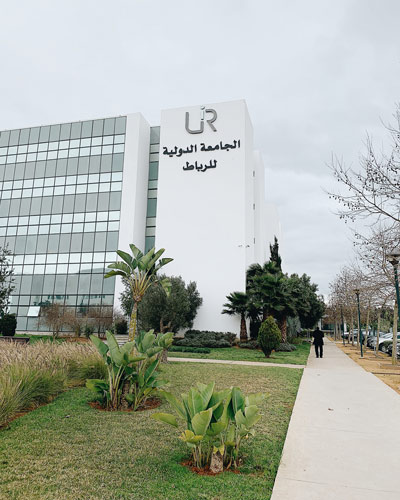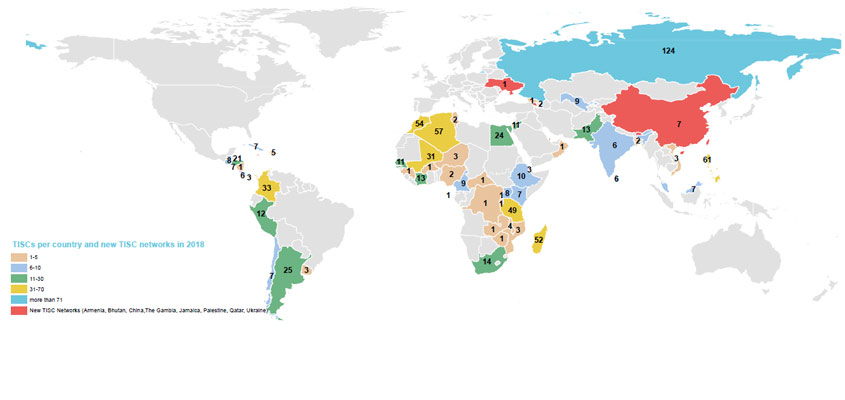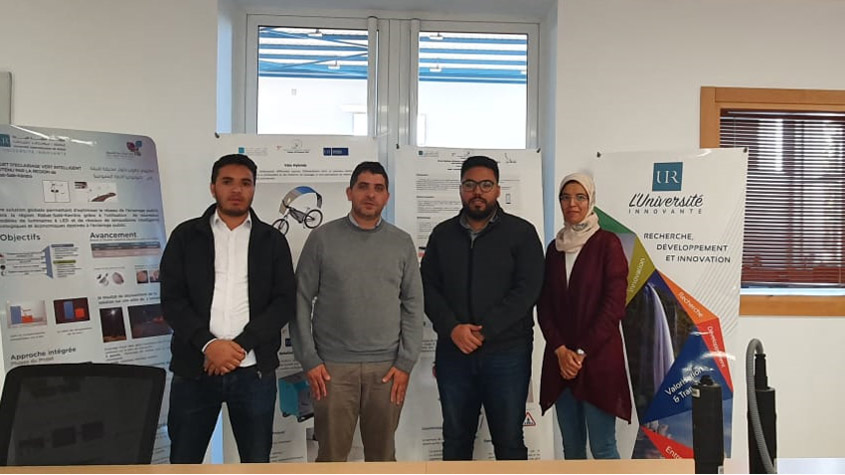
WIPO’s TISC program: helping inventors unlock their potential
By Andrew Czajkowski and Elangi Botoy, Technology and Innovation Support Division, WIPO
WIPO’s Technology and Innovation Support Center (TISC) program facilitates access to technical and scientific knowledge and thereby reduces the knowledge gap in developing and least developed countries. By providing access to specialized scientific and technical databases and the training required to enable users to extract value from their use, the program aims to promote innovation and its commercialization through more effective use of the intellectual property (IP) system. The program was first conceptualized under the WIPO Development Agenda (Recommendation 8), adopted by WIPO member states in 2007, and has been operating since April 2009.

become a national innovation leader and is the first university in
Morocco to set up a technology transfer office, which also serves
as a TISC. In 2012, the University won the first National Innovation
Prize for its efforts in promoting training, research,innovation and
technology transfer with the private sector.
Since then, 80 countries, of which 26 are least developed countries, have signed up to the TISC program and have established national TISC networks. More than 900 TISCs are now in operation.
The program helps inventors, researchers and entrepreneurs unlock their innovative potential by providing access to on-the-ground information and support services relating to innovation and IP. The services offered by TISCs vary, ranging from basic support services, such as access to and assistance in using patent, scientific and technical databases, to more sophisticated value-added innovation support services, such as assistance and advice on IP management or patent analytics. Through these centers, inventors can build on the wealth of technological information found in millions of patent documents and thousands of scientific and technical publications.
TISCs are financially and technically self-supporting institutions to which WIPO provides advice on demand. They may be located in a variety of host institutions, including patent offices, universities, research centers, and science and technology parks. By the end of 2018, 34 of the 80 countries participating in the program had reached some degree of sustainability, defined in terms of institutionalization, operationalization and the provision of a broad portfolio of innovation support services, including value-added services such as the drafting of patent landscape reports.
TISCs play a key role in promoting innovation and business growth, with the potential to support the creation of jobs and the social and economic development in countries in all regions of the world. The resources they provide are relevant to a wide range of actors – researchers, entrepreneurs, universities, technical and vocational schools, research centers, SMEs and their associations, laboratories and inventors.
Scientific and technical resources
Over the past decade, WIPO has developed a range of publications, platforms, training materials and tools to build the services provided by TISCs, broaden access by TISC users to valuable scientific and technical information and enable them to use these resources more effectively.
Patent databases are a major source of technological information and knowledge. Some of them comprise more than 100 million patent documents. WIPO trains TISC staff to navigate, search and analyze the prior art (all the technologies contained in the patent documents) contained in patent databases, such as WIPO’s PATENTSCOPE, which is free of charge. A first step for a TISC in advising a user is to identify the databases that are most relevant to the technology in question. TISC staff then support users by showing them how to use key words and patent classification systems to perform searches to generate relevant results.
Beyond access to PATENTSCOPE, TISCs also benefit from two public-private programs provided by WIPO. These programs – the Access to Research for Development and Innovation (ARDI) program and the Access to Specialized Patent Information (ASPI) program – allow users to broaden their search by accessing subscription-based scientific and technical journals and commercial patent databases.
The ASPI program includes a range of sophisticated tools for searching, retrieving and assessing technologies and is available thanks to a partnership with nine of the world’s leading commercial patent database providers.
The ARDI program is part of the Research4Life partnership, which includes a number of specialized programs: HINARI from the World Health Organization; AGORA from the Food and Agriculture Organization of the United Nations; OARE from the United Nations Environment Programme; and GOALI from the International Labor Organization. These programs provide online access to nearly 100,000 international peer-reviewed scientific and legal journals, books, and databases to more than 9,000 institutions in developing and least developed countries.
Over the last decade, WIPO has created a wide range of publications and other resources to boost the capacity of TISCs around the globe. The publications are key references and cover a range of subjects, including patent documentation and databases, patent search, patent analysis and TISC management. They also include WIPO Patent Landscape Reports, which offer useful insights on patent filing trends and technical and business information in areas such as public health, food and agriculture, environment, energy and disabilities.
Earlier this year, WIPO launched its new Technology Trends series, which tracks the development of technologies through the analysis of data on innovation activities. The first report, launched in January 2019, examines global patenting trends in the area of artificial intelligence (AI). It compares patenting activity with scientific publications; identifies top players from industry and academia across different technologies and application fields; highlights the geographical distribution of AI patent protection; and examines existing AI policies and future prospects. The analysis, which is based on patent and scientific data, is complemented by business information as well as contributions from leading AI experts.
Promoting best practice
Sharing experiences and best practices is widely encouraged, whether between national TISC networks or regional networks such as those comprising member states of the ARIPO, or through the eTISC virtual network.

The eTISC online platform connects the TISC community and other interested parties. The platform allows members to share knowledge and experiences across national and regional boundaries and offers access to a growing number of specialized platforms, portals and tools, to support TISC staff and users in accessing the knowledge required to commercialize and bring their innovative outputs to market.
Examples of TISC services
Demand for TISC services across the globe continues to grow, and in Africa, the TISC network is expanding every year. For example, in Benin, four new members joined the network in 2018 and others are in the pipeline. Sixteen new institutions also joined the TISC network in Madagascar, making it one of the largest in the region with 73 centers. Also in 2018, ARIPO established a regional TISC network to promote the sharing of experiences and best practices to catalyze innovation and development across the region. Such expansion is making it possible to direct more services to local needs.
Every year, TISCs reach out to innovators, researchers and entrepreneurs to encourage and support them in using the global IP system to leverage the economic value of their work and to foster local innovation. In Madagascar, for example, more than 200 people from universities, research centers, SMEs and industry received dedicated training on IP through the national TISC network. Members of that network also took part in industry, science and research events across the country to raise awareness about patent information and offer training on the practical aspects of searching patent databases.
A direct impact on innovation and value creation
The support that TISCs are providing local innovators is having a direct impact on the local innovation landscape. The growing number of patent applications in participating countries is evidence of this. In Benin, for example, five patent applications have been filed through the TISC network with OAPI. In Madagascar, TISCs supported the filing of 35 patent applications with OAPI and five other international patent applications under the Patent Cooperation Treaty (PCT). Similarly, in Morocco, TISCs had a hand in the filing of 121 national patent applications with the Moroccan Office of Industrial and Commercial Property (OMPIC) and 15 international patent applications filed under the PCT. Sixty-six percent of all patent applications filed with OMPIC by Moroccan applicants in 2018 were filed by members of the national TISC network.
The technology and innovation support services offered by TISCs create real value, in particular, by facilitating the transfer of the technologies needed to address local needs. For example, in Madagascar, TISCs have helped to reveal 41 patents covering technologies relating to meat processing and 31 patents covering technologies relating to vanilla processing that are in the public domain, meaning the associated technologies are free for use by entrepreneurs in the country.
TISCs are also creating real value by promoting IP and its use within academia to support the commercialization of research outputs. In 2018, two members of the Morocco’s TISC network, the Université Internationale de Rabat (IUR) and the Université Hassan 1er de Settat, signed a formal agreement with OMPIC to provide value-added innovation services for universities and research and development centers across the country. The aim of the initiative is to support researchers in using the IP system to protect their outputs with a view to leveraging their economic value, securing research funding, boosting business growth and creating employment.
New opportunities for innovation
The expansion of the TISC network is also creating opportunities for greater cooperation between countries. This, in turn, is strengthening the network, increasing its reach and improving its sustainability. Within Africa, for example, in 2018, Djibouti and Madagascar initiated a partnership to exchange experiences and best practices on managing national TISC networks. Similarly, Morocco and OAPI have joined forces to prepare a patent landscape report on green technologies, including in the areas of water treatment, biodegradable plastics and food packaging.
Insofar as the TISC program provides access to more than 100 million patented technologies and to more than 100,000 scientific publications, it has been instrumental in putting developing and least developed countries on a more equal footing with industrialized nations. The TISC program means that developing countries, and least developed countries, in particular, can more easily identify, use and adapt existing technical solutions to address local problems and avoid reinventing the wheel. Continued expansion of the TISC program will enable developing countries in Africa and beyond to foster innovation and the advancement of science and technology, improve business competitiveness and growth, create jobs and promote sustainable social and economic development. TISCs have achieved a lot over the past 10 years; it will be interesting to see how they continue to shape the global innovation landscape in the next decade.
TISCs at work: Uganda’s banana business

- Uganda is the world’s second largest producer of bananas after India. Bananas are a food staple in Uganda and much of East Africa. They are a key ingredient of matooke, a traditional Ugandan dish.
- More than 75 percent of Uganda’s farmers cultivate bananas, but are often unable to optimize the return on their harvest because their crop ripens too quickly or because poor post-harvest handling means the fruit does not meet the quality standards required for export. These factors result in significant wastage.

University “to guide participants to develop projects from
conceptualization to implementation, to scale up technologies, and
to create competitiveagribusiness enterprises.”
(Photo: Natalia Rodriguez/WIPO)
- Recognizing the need to find a solution to the problem, George Bazirake, a food scientist at Kyambogo University in Kampala, has found a way to extend the shelf life of the country’s banana harvest. He has also developed alternative ways to use the peel of over-ripe bananas to make vinegar or biodegradable bags and mats, for example.
-
Around 7 million people consume matooke in Uganda every day. We have one of the highest consumptions per capita of bananas but there’s a lot of waste coming from the banana that is not used. I realized that I wanted to solve the problem,
says Dr. Bazirake. - In 2009, he began developing an enzymatic inactivation process followed by vacuum sealing to extend the shelf life of bananas. Using this method, peeled bananas can last up to six months when refrigerated. The process also generates significant freight savings as a peeled, vacuum-sealed banana weighs about 40 percent of its original weight.
- Dr. Bazirake was granted a patent for his method and has since registered his technology with the United States Food and Drug Administration, which means that Ugandan bananas processed in this way can now be exported to the United States. Innovations developed by Dr. Bazirake relating to the production and processing of bananas are providing employment for 12 farmers through AfriBanana Products Limited (ABP), an agribusiness consortium, which he founded with a team of researchers.
- Dr. Bazirake is a keen advocate of better education and is committed to promoting and supporting innovation in Kyambogo University, where he is Dean of the Faculty of Sciences. Dr. Bazirake is an active participant in training events organized by the University’s TISC, one of eight TISCs currently operating in Uganda. At these events, he shares his experiences with young students and researchers to encourage them to take advantage of the resources offered by the TISC.
-
I want young people to appreciate science and technology. I like to be a mentor for students and promote a problem-solving mindset,
says Dr. Bazirake.
- The program is led by Kyambogo University in collaboration with other TISC members including the Mbarara University of Science and Technology and the Uganda Industrial Research Institute, among others.
We select around 60 students every summer. They apply to our program and we provide them with the training and mentoring they need to develop entrepreneurship skills. It is important to create an innovation environment, especially among young people,explains Dr. Bazirake
His goal now is to convince government policymakers of the need to promote research and innovation within Uganda’s educational curriculum. -
My goal is to engage the political arena to support more and more education projects around science and technology. We need the government to allocate a higher percentage of the GDP to research. I’m working hard for that.
TISCs at work: establishing successful innovation structures in Morocco
- Founded in 2010, the International University of Rabat (IUR), located in the heart of Technopolis Rabat-Salé, is a semi-public university with a strong focus on engineering and business management. Although a relatively young institution, IUR has become a national innovation leader. It is the first university in Morocco to embrace technology transfer-focused research projects and the publication of high-quality articles in the international arena.
- In 2012, the University won the first National Innovation Prize for its efforts in promoting training, research, innovation and technology transfer with the private sector.
- Thanks to a series of successful partnerships with industry, IUR now holds 311 national patents and 58 patents in other countries, making it one of the country’s leading patent filers. How has such a young university managed to create such a successful innovation culture?
- Mr. Mohsine Bouya, Director of Valorization and Transfers at IUR believes the answer lies in the establishment of its technology transfer office (TTO), which also serves as a TISC, and its close relationship with industry. IUR is the first academic institution in Morocco to have a TTO and a TISC.

- The presence of a dedicated TTO within a university campus supports the transfer of the wealth of knowledge generated by university researchers to industry, so that society as a whole can benefit from it. A dedicated TTO allows universities and research institutions to protect their outputs with IP rights and to license these to industry. IUR’s TTO is supported by a multidisciplinary team of professionals. Its role as a TISC has enabled IUR to reduce the costs associated with assessing their inventions and developing patenting strategies around them.
- The office focuses on three main areas: IP protection, incubation (including the acceleration of startups) and negotiation (e.g. licenses, spinoffs and commercialization).
Our team works to develop activities on how to transfer technologies, but also on how to create, manage and build tech transfer offices,
notes Mr. Bouya. - Technology transfer partnerships can generate multiple benefits. Universities and research institutions, for example, benefit from the identification of new and commercially valuable research topics, and new income streams to support research funding. And companies benefit from new business opportunities arising from the expertise of researchers in developing new products or in solving specific problems facing a particular industry.
- Technology transfer has allowed the university to expand its patent portfolio. In recent years, IUR has been working with the private sector on research projects focused on transport, safety and renewable energy.
In some cases, projects result in the creation of spin-offs. In these circumstances, the university and its private sector partner each has a stake in the business and the commercialization of the products. This was the case when IUR researchers co-developed a new air-conditioning system with a private company. IUR researchers are currently working on artificial intelligence (AI) innovations, such as autonomous drones, with Atlas Space. - The success of IUR’s TTO is also attributable to its commitment to training and mentoring its staff, researchers and students on IP issues, which is an important factor in any innovation strategy. Each year, TTO staff meet with the Moroccan Office of Industrial and Commercial Property to develop a schedule of TISC-supported IP training activities.
The WIPO Magazine is intended to help broaden public understanding of intellectual property and of WIPO’s work, and is not an official document of WIPO. The designations employed and the presentation of material throughout this publication do not imply the expression of any opinion whatsoever on the part of WIPO concerning the legal status of any country, territory or area or of its authorities, or concerning the delimitation of its frontiers or boundaries. This publication is not intended to reflect the views of the Member States or the WIPO Secretariat. The mention of specific companies or products of manufacturers does not imply that they are endorsed or recommended by WIPO in preference to others of a similar nature that are not mentioned.